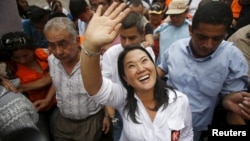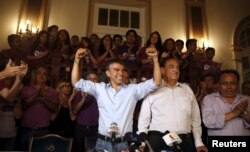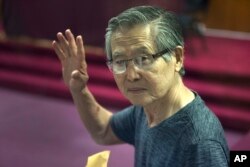Keiko Fujimori, the daughter of Peru's imprisoned former president Alberto Fujimori, is the front-runner in this year's election but her links to his authoritarian rule could derail her in a likely run-off vote.
Languishing in a prison on the outskirts of the capital Lima, the 77-year-old Alberto Fujimori remains a deeply divisive figure in the Andean nation.
He is revered by many for quashing a bloody guerrilla insurgency during his 1990-2000 presidency and turning around an economy in ruins, but is loathed by others for human rights abuses and corruption convictions.
Known in Peru simply as Keiko, his 40-year-old daughter is promising to battle rising crime and jump-start Peru's sluggish economy despite a global slump in commodity prices.
A center-rightist, she plans to use a nearly $8 billion government "rainy-day fund" to finance what she dubs a "shock" in infrastructure spending to spur growth, and offer tax breaks to companies training and hiring young workers.
On the campaign trail, she borrows from her father's populist style in appealing to the poor.
But she has softened her once staunch defense of his decade in power, trying to fix a problem that cost her victory at the last election in 2011, and is promising to unify a country where one in five live in poverty.
"We must work for the people who feel forgotten by the indifference of the state," Fujimori told Reuters between campaign stops in the highland region of Huancavelica.
In the run-up to the first round voting on April 10, Fujimori consistently wins the support of 30 to 35 percent of voters in opinion polls, with a double digit lead over her nearest rivals. But she needs at least 50 percent to win outright and recent polls show her virtually tied in a second-round runoff against Julio Guzman, a centrist technocrat who has climbed quickly as he galvanizes her opponents behind him.
Guzman calls Fujimori a despot in democrat's clothing: "What's at stake in these elections is democracy or a return to dictatorship," he said recently.
The same tactic helped President Ollanta Humala scrape a second-round win in 2011 when Fujimori was slower to distance herself from her father. Humala is constitutionally barred from seeking a second consecutive term.
Peru's next president will inherit an economy underpinned by surging copper output from new mines, but no major projects are set to come on line in coming years and a persistent slump in the global price is a threat.
Fujimori proposes "regulatory incentives" for exporters, although she has given few details. She says she would direct spending toward public works such as roads, irrigation canals and water plants.
Her economic advisor, Jose Chlimper, says she will not spend frivolously. "We're not going to have a party. There's going to be a sense of urgency watching every dime," said Chlimper, who briefly served as her father's agriculture minister.
Father's Legacy
It is a far cry from the mass privatizations, lifting of currency controls and slashing of subsidies that her father pushed through to fix an economy crippled by a deep recession, hyperinflation and a debt default.
Yet the darker side of her father's legacy still looms large over her candidacy. He was found guilty of crimes ranging from ordering death squads to massacre civilians in a ruthless counter-insurgency campaign to bribing tabloid journalists with public funds to attack political enemies.
Skirmishes at some of Keiko Fujimori's rallies have revived concerns that she might be intolerant of dissent. In Huancavelica, her campaign team confronted a small group of roadside protesters, prompting clashes.
"She'll be a criminal just like her father!" said Federica Leon, a 41-year-old mother of two who watched as Fujimori loyalists tore a banner from an opponent.
Fujimori first became well known as a teenager when her father named her first lady after divorcing her mother. She often joined him on foreign trips. She studied in the United States and won a seat in Peru's Congress in 2006. Five years later, she made her first run for the presidency.
Facing another close-fought run-off, Fujimori has tried to ease concerns about her father's strongman legacy.
In late December, she removed three of his loyalists from her party's congressional list and has vowed not to repeat his government's "crimes and errors." She has also promised compensation for scores of women forcibly sterilized on his watch.
"What you see now is a completely renovated party," she said.
Fujimori's critics say she takes orders from her father, in prison since 2007 and serving a 25-year sentence, and will free him if she wins, charges she has repeatedly denied.
She insists her father is innocent, has lobbied for his release and believes he will eventually be cleared in the courts, but she has vowed not to pardon him if she is elected president.
"People say her father was autocratic, but I think we should give her a chance," said Yolanda Reyes, a 28-year-old food vendor in a Lima shantytown who is one of a growing number of voters too young to remember well Alberto Fujimori's rule.







